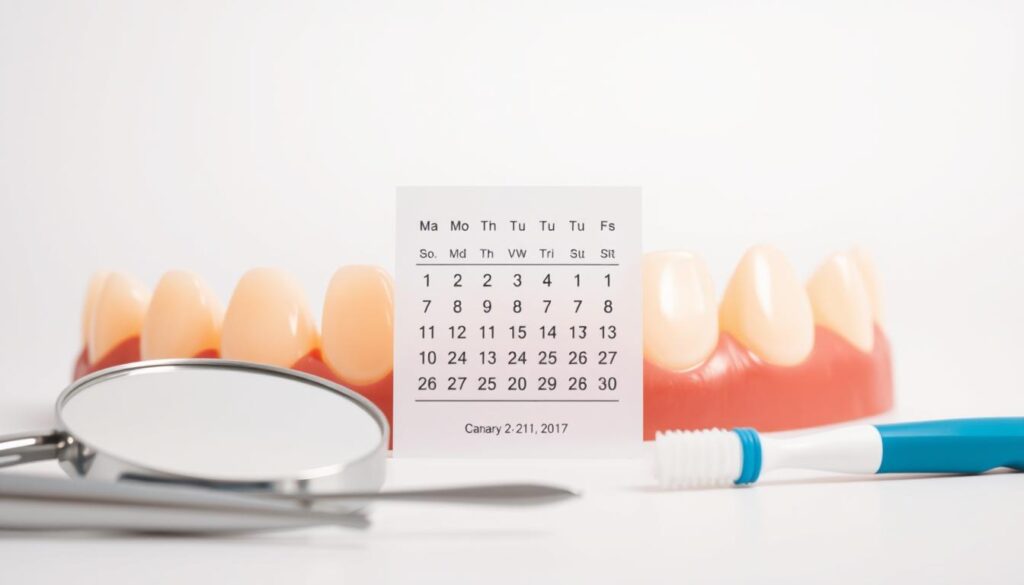How Often Do I Need a Dental Cleaning and Exam?

Over 100 million adults in the United States skip dental checkups each year. This is a big concern. The American Dental Association points out a key question: how often should I get a dental cleaning and exam?
Experts say you should visit your dentist every six months. But, some people might need to go more often. This depends on how well you brush your teeth, your health, and your genes.
Key Takeaways
- Twice-yearly cleanings target plaque before it causes gum disease.
- Consistent exams can catch tooth decay early.
- Personal health status affects how often you may need a dental cleaning and exam.
- Proactive care helps prevent more serious complications.
- Consulting a qualified dentist ensures a schedule tailored to individual needs.
Understanding Dental Cleanings
Regular dental checkups are key to keeping your teeth and gums healthy. Many people wonder how often they should get their teeth cleaned. It’s crucial to remove harmful buildup that brushing can’t get rid of.
Technicians use special tools to clean areas your toothbrush can’t reach. Knowing what happens during a cleaning can make you feel more confident. Regular cleanings help your gums stay healthy over time.
What Is a Dental Cleaning?
A licensed hygienist starts by checking your mouth for any problems. Then, they scale and polish your teeth to cut down on bacteria. They might use water sprays to clean out any leftover debris.
Importance of Regular Cleanings
Having a regular cleaning schedule helps catch problems early. Studies show that catching issues early can prevent serious gum disease and tooth loss.
| Cleaning Step | Key Benefit |
|---|---|
| Scaling | Removes stubborn deposits |
| Polishing | Smooths tooth surfaces |
| Inspection | Identifies emerging issues |
Types of Dental Cleanings
Keeping your teeth strong means regular visits to the dentist. Some people have just a little plaque, while others have more serious issues under the gums. Dentists look at each mouth to decide the best cleaning plan.

Standard Cleaning vs. Deep Cleaning
Standard cleaning removes plaque from the teeth you can see. It uses gentle scaling and polishes the enamel for a shiny finish. For many, this is enough to keep gums healthy and teeth strong.
Deep cleaning is for more serious problems. It scales below the gum line to remove hidden tartar that hurts soft tissues. Sometimes, it’s done with treatments for early gum disease.
When Is Deep Cleaning Necessary?
Deep cleaning is key when gum pockets form or pain doesn’t go away. Signs include swelling and bleeding that show bacteria spreading under the gums. Catching it early can save your teeth and prevent bigger problems.
| Cleaning Type | Key Focus | Ideal Use |
|---|---|---|
| Standard | Surface plaque removal with routine polishing | Regular maintenance for healthy gums |
| Deep | Below-gum scaling to manage deeper deposits | Patients with early periodontal risks |
Frequency of Dental Cleanings
Good cleaning habits and regular check-ups are key to keeping your mouth healthy. Experts say you should visit the dentist at least twice a year. These visits help catch problems like plaque and gum inflammation early.

General Recommendations for Adults
Adults usually need a cleaning every six months. This lets dentists remove tartar and check for any issues. It also helps them give tips on better oral hygiene. Skipping these visits can lead to unnoticed problems.
Special Considerations for Children
Children need more attention because their teeth and mouth are still growing. Regular check-ups help make sure their teeth are coming in right and there are no cavities. It also teaches them how to brush their teeth properly from a young age.
Factors Influencing Cleaning Frequency
Some health issues and lifestyle choices mean you might need to go to the dentist more often. These include:
- Smoking or tobacco use
- Chronic illnesses like diabetes
- Family history of gum disease
Adjusting your dental visits based on these factors can help keep your teeth and gums strong. Being aware of your personal risk factors makes these visits more important for your long-term health.
What to Expect During Your Appointment
Every dental visit is designed to protect your teeth and gums. You’ll feel relaxed as your teeth are cleaned and a personalized plan is discussed. This plan helps you keep your dental hygiene routine strong.
Regular visits and good habits at home make a big difference. After your cleaning, you’ll learn how to brush and floss better. This helps keep your teeth safe from harm.
The Cleaning Process Explained
The hygienist starts by removing tartar that hides below your gums. Then, they polish your teeth for a shiny finish. Next, flossing removes food bits stuck between your teeth.
Some people also get a fluoride treatment to prevent cavities. The whole process usually takes less than an hour. It keeps your teeth looking and feeling great.
Common Tools Used by Dentists
Dentists often use ultrasonic devices and polishing tools to clean your teeth. These tools remove stains and hard buildup. You can find more details in this comprehensive exam guide. It ensures you get the best care for your teeth.
Benefits of Regular Dental Exams
Going to the dentist regularly keeps your teeth strong and gums healthy. Many clinics do oral health checks to catch small problems early. This helps fix issues before they get worse.
Dentists use special tools to find tiny cavities, gum issues, or tooth problems. Finding these early can prevent pain and avoid bigger treatments.
Early Detection of Oral Issues
Early checks can spot problems before they grow. This saves time, money, and keeps your smile bright.
Impact on Overall Health
Good dental care is linked to your overall health. Research shows that gum infections can lead to heart disease. So, taking care of your teeth helps your whole body.

Regular dental exams help your overall health by catching issues early. This approach is backed by research to keep you healthy for years to come.
| Key Factor | Benefit |
|---|---|
| Timely Intervention | Prevents extensive damage |
| Improved Comfort | Lowers pain and swelling |
Signs You Might Need More Frequent Cleanings
Some people notice signs that they need to see their dentist more often. Swollen gums, bad breath, or gum recession are warning signs. These could mean you need more than just regular cleanings.
Dentists at the American Dental Association might change how often you need cleanings. This depends on your personal health history. For example, smokers and those who eat a lot of sugar might need more visits because they get plaque faster.
Gum Disease Symptoms to Watch For
Red gums or bleeding when you brush are signs you need to pay attention. Catching these early can stop gum disease from getting worse.
Increased Plaque Buildup
Some people get plaque faster, especially if they have diabetes or a weak immune system. Seeing your dentist more often can help keep your mouth healthy.

| Indicator | Reason to Increase Visits |
|---|---|
| Bleeding Gums | Potential Gum Disease Progression |
| Persistent Bad Breath | Bacterial Accumulation Beneath Gumline |
| Excess Plaque | High Sugar Intake or Smoking Habits |
| Gum Recession | Early Sign of Tissue Damage |
The Role of Dental Hygiene at Home
Keeping up with dental care at home can make each visit to the dentist more effective. Regular habits are key to keeping your mouth healthy for a long time. Gums can stay healthy if you brush and floss gently but thoroughly.
Brushing and Flossing Techniques
When brushing, hold your toothbrush at a 45-degree angle against your gums. This helps remove plaque, especially where teeth and gums meet. Use small, gentle strokes to protect your enamel. Flossing between each tooth removes tiny particles and helps gums stay healthy.
Some people use reminders on mirrors or devices to remember to brush and floss.
Using Mouthwash Effectively
Using mouthwash with antibacterial properties can kill bacteria and leave your mouth feeling fresh. Using it regularly helps protect your teeth between dental visits. Brushing, flossing, and mouthwash together make a complete dental care routine.
How Dental Insurance Covers Cleanings
Many insurance providers offer preventive coverage to help keep your teeth healthy without breaking the bank. Plans from big names like Delta Dental or Aetna often cover two routine cleanings a year. But, the details can vary by state and carrier, so it’s smart to check ahead of time.
Some policies match up with the latest dental exam recommendations. They focus on regular preventive care to keep your mouth healthy.
Typical Coverage Plans
Most plans help lower or remove costs for standard cleanings. Employers might offer group policies that focus on preventive visits. These plans usually cover basic services like fluoride treatments.
But, some treatments might need you to meet a deductible first. This way, regular dental care is encouraged while keeping costs in check.
Understanding Out-of-Pocket Costs
Specialty cleanings or extra visits for periodontal issues can cost more. Deductibles might reset every year, so it’s important to keep track of your benefits. You might also face copays or coinsurance percentages.
It’s crucial to read the fine print and talk to both your dentist and insurance company. This way, you can make sure you’re getting the care you need while staying within your budget.
Choosing the Right Dentist for Cleanings
Finding a good dentist is key to a healthy smile. They should have the right training and credentials. This ensures they can handle your dental needs well.
They should also use the latest methods and make you feel welcome. This encourages you to visit regularly and manage dental problems over time.
What to Look for in a Dental Practice
Look for dentists with modern tools to find plaque and deep dental problems. They should offer sedation if you’re nervous about dental work. Some dentists specialize in kids or advanced treatments, offering care for all ages.
The best clinics keep up with new technology and education. This helps them diagnose problems more accurately.
Importance of Patient Reviews
What others say about a dentist is very important. Reading reviews gives you a real idea of their quality and how happy patients are. It shows how the staff treats patients and how quick they are to schedule appointments.
Good reviews mean a dentist is trustworthy. Praise for their professionalism shows they care about your oral health.
Conclusion: Staying Proactive About Your Oral Health
A healthy mouth is key for clear speech, easy chewing, and comfort. Regular dental visits catch small issues early. We aim to teach patients how to prevent problems for better health and confidence.
Making Regular Appointments a Priority
Seeing a trusted dentist regularly can prevent expensive treatments. Early checks can spot gum disease, leading to better care. Many feel secure with a dental plan that matches their life and insurance.
Tips for Maintaining Oral Hygiene
Brushing daily removes plaque that can hurt gums. Flossing gets rid of bacteria in tight spots. The right mouthwash can cut down on bad breath and strengthen teeth. Eating less sugar is also good for your mouth.
By focusing on home care and regular dental visits, you can keep your mouth healthy. This approach leads to better health and a better life.


